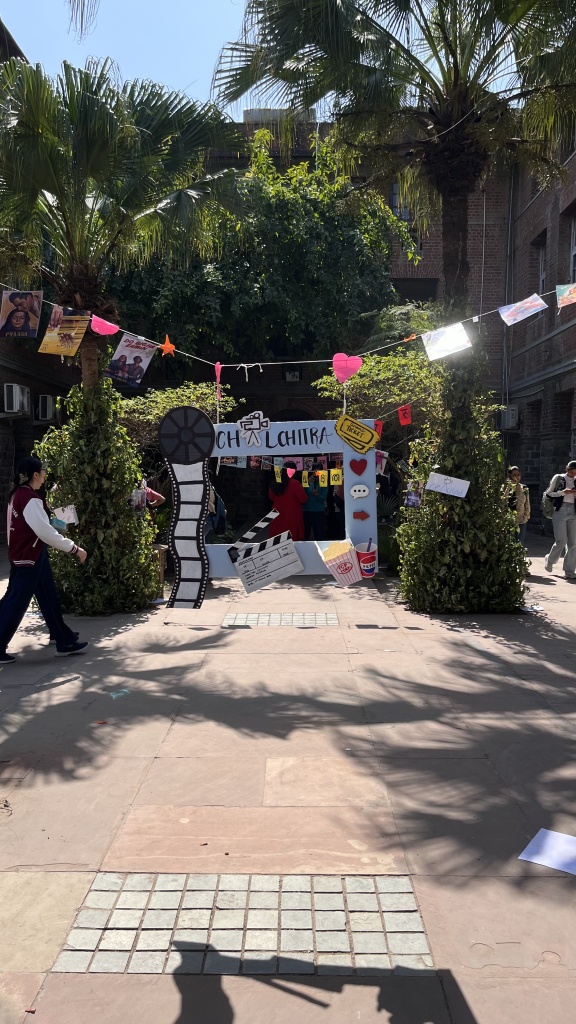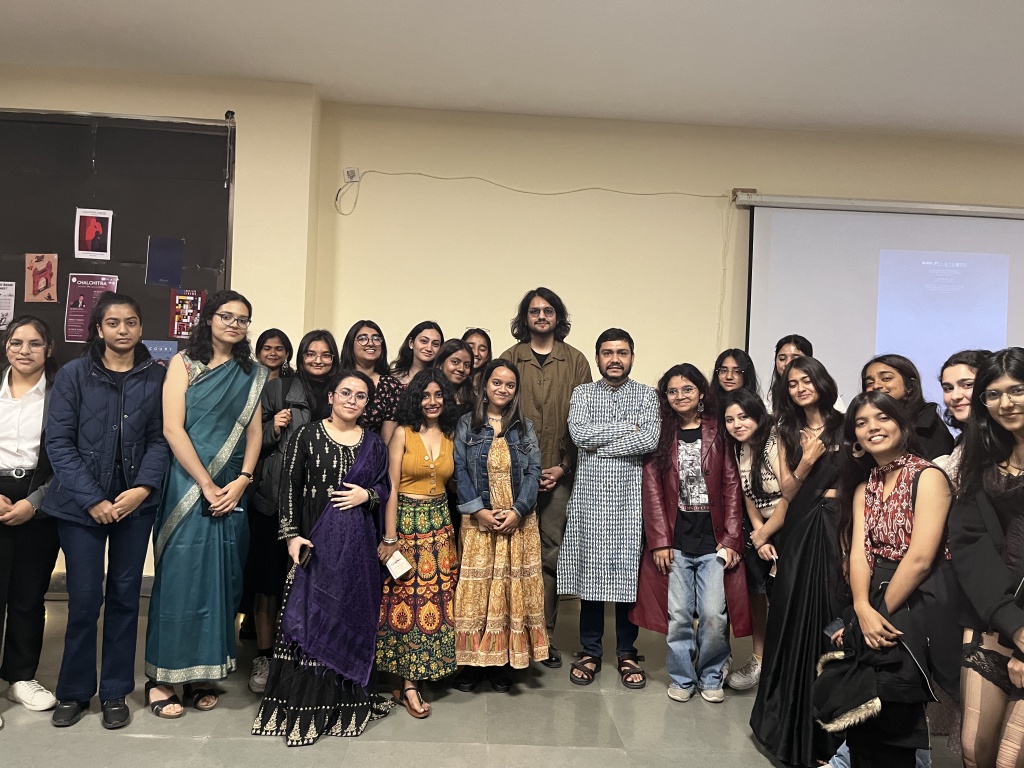
Celluloid’s annual fest for 2024, Chalchitra, on the theme ‘Bhasha aur Chalchitra’ was held on March 4th, 2024. It began with a screening of the Maithili film Dhuin(2022), which narrates the tale of Pankaj, a small-town theatre performer aspiring to become well-known in Mumbai.

Discussion with Achal Mishra – Moderated by Professor Mihir Pandya
It was followed by a question-answer session with Achal Mishra, the director of Dhuin, and the award-winning film Ghamak Ghar. It was moderated by Mihir Pandya, a professor at University of Delhi. The session took place at the mini auditorium in Miranda House and was an enlightening look at Mishra’s experience with filmmaking and his creative process. The session began with Mishra explaining his decision to make movies in Maithili instead of Hindi. He expressed his desire to showcase the nuances of Dharbangar Maithili and wanted to promote it, even if that meant that his movies would only accumulate limited reach.

He then talked about the kind of films that he grew up watching, and the films that inspired him to make films of his own. The film Babel had a great influence on his life, and he loved Satyajit Ray’s films. Mishra conveyed in detail how movies from Asian film industries such as Indian, Chinese, Turkish, Iranian, Japanese, etc. played an important role in his life and career(films such as The Time To Live and The Time To Die, Yi Yi), and how literature was also very influential to him.

Talking about his visual language, he said that visualizing is a skill, and it is something that becomes better with practice and craft.The other points of discussion included the nostalgia associated with Mishra’s first film Ghamak Ghar, challenges with language and duration(particularly about the monopoly of few languages in streaming platforms), interpretations of various scenes from Dhuin, and the inspirations behind them.
Mishra and Pandya engaged in a very illuminating conversation about Mishra’s craft, and how each scene was visualized and picturized despite all the limitations that Mishra and his team had to face. Towards the end of the session, Mishra also took up questions from the audience, which led to a series of fruitful discussions.

Screening of Submitted Films and Result Declaration
The next event was the screening of the selected short films which were received as entries for the Short Film Competition and On-The-Spot Filmmaking Competition conducted as a part of the fest. The Short Film Competition saw submissions from students from colleges all over India, out of which five were shortlisted for screening. The films were judged by Dr. Mithuraj Dhusiya, who is an Associate Professor at Hansraj College, University of Delhi. Dr. Dhusiya gave his valuable feedback on each of the shortlisted films and also praised the quality and craft of the submissions and the talent and passion of the participants. The winner of the competition was Sufiya Sarmad with Sharique K P. as the runner up.

LingoLumiere: The On-The-Spot Filmmaking Contest took place on 26th February 2024 at Miranda House. The topic for the same was ‘Homonyms’, and participants had to work with a time constraint to make and edit their short film. The competition was judged by Gorvika Rao, who is an Assistant Professor in the Department of English at Miranda House, University of Delhi. After each short film was screened, Rao gave her review and opinion of it, while appreciating the creativity behind each film.

The films were all executed with unique perspectives, and it was enlightening to see how different teams interpreted the theme in different ways. The winner of the competition is Team Effulgence, whose members are Bhavika, Banshieka, Madhulika, Daksh, Gautam, and Akash. The runner-up is Team Baqsa, whose members are Abhya Kaushik, Aashi Tokas, Prashansa Raj, Abhinav Mankotia, and Sriram Senthilkumar. Gorvika Rao and Dr. Dhusiya presented the winners with gifts.
Results Declaration of Blog Submissions
After the screenings, The Blog Team heads of Celluloid, Pavaki, and Sneha Dey were called upon to talk about the theme and announce the winners of the Article Writing Competition and Screenwriting Competition. The Artice Writing Competition, ‘Lost in Translation’, invited articles exploring the language barrier between art and the audience, and how language transcends more dialogue exchange in cinema, intricately weaving into the storytelling fabric, influencing scenes, characters, and plots. The competition was judged by Tanul Thakur, who is an award-winning Mumbai-based film critic and independent journalist.
The winner of the competition is Shobika SP and Abdhi, and the runner-up is Jessy Thomas. The Screenwriting Competition, ‘We’ll Burn That Bridge When We Get To It’, invited participants to write a screenplay where characters climb over the walls of language barriers and differences and find their way to each other. The judge for this event was Shiv Kumar Sharma, who is a filmmaker, writer, and actor. The winner of the competition is the team led by Ishaanvi Singhal, and the runner-up is the team led by Nibirjyoti Mridusmita.
Discussion with Chaitanya Tamhane – Moderated by Professor Harish Wankhade
As attendees settled back into their seats after a refreshing lunch break, the atmosphere in the conference hall buzzed with anticipation for the continuation of the event by the captivating discussion on Chaitanya Tamhane’s acclaimed films “The Court” and “The Disciple.” Moderated by the esteemed Prof. Harish Wankhade from JNU, the session promised to unravel further layers of insight into Tamhane’s cinematic journey and his profound perspective on the evolving landscape of Indian cinema.

With the stage set, Prof. Wankhade wasted no time in steering the conversation towards Tamhane’s entry into filmmaking as a career. As attendees leaned forward, eager to glean insights, Tamhane eloquently traced his journey back to his hometown Mumbai, where the vibrant tapestry of cinematic culture shaped his artistic sensibilities from a young age. Despite harboring initial aspirations in theatre and acting, Tamhane’s immersion in world cinema, particularly the works of auteurs like Tarkovsky, ignited a fervent passion for filmmaking within him.Tamhane’s discourse on the contemporary film industry struck a chord with the audience, as he lamented its commercialization at the expense of artistic integrity. He articulated the importance of diverging from mainstream conventions, advocating instead for narratives that challenge and provoke thought.Throughout the dialogue, Prof. Wankhade probed into the literary nature of Tamhane’s films and their unconventional commercial appeal. Tamhane, true to form, offered a nuanced perspective, asserting that a film’s commercial classification is contingent upon its reception rather than inherent qualities. This assertion underscored Tamhane’s unwavering commitment to authentic expression over commercial considerations.

As the discussion unfolded, Tamhane shed light on the role of language as a tool for conflict in his films, enriching the discourse with yet another layer of depth. The conversation reached its zenith with an exploration of Tamhane’s award-winning masterpiece, “The Disciple,” described by Prof. Wankhade as “frightening.” Tamhane, in turn, peeled back the layers of his cinematic nightmare, delving into themes of talent, discipline, and the elusive pursuit of artistic excellence.
Session by Mr. Shiv Kumar
The last leg of the event was an enlightening session led by the esteemed filmmaker Shiv Kumar. Like a torchbearer following Tamhane’s cinematic blaze, Kumar illuminated the essence of true cinema, captivating the audience with his profound insights.In the wake of Tamhane’s enthralling presentation, Shiv Kumar embarked on a journey through the depths of cinematic artistry. With the fervor of a true cineaste, Kumar recounted his personal odyssey, enriched by diverse cultural influences and cinematic experiences that transcended geographical boundaries.Drawing from his profound personal experiences, he advocated for a holistic approach to filmmaking, emphasizing the symbiotic relationship between creativity and spiritual introspection.

In his session, Shiv Kumar likened true cinema to an elephant, vast and multifaceted. Embracing the perpetual learning inherent in filmmaking, he elucidated on the cyclical journey of a film’s creation and demise, highlighting the pivotal roles of scriptwriters, filmmakers, and editors in shaping cinematic narratives.Furthermore, he underscored cinema’s role as an amalgamation of all art forms, urging aspiring creators to transcend mere storytelling and vividly portray cinematic experiences that capture the essence of life itself. His session transcended mere instruction, offering participants a profound insight into the essence of true cinema—a journey of perpetual learning, artistic exploration, and spiritual introspection, ignited by the celluloid blaze of Chaitanya Tamhane’s cinematic universe.

In conclusion, the Celluloid’s annual fest for 2024, Chalchitra, was a resounding success, offering a vibrant tapestry of cinematic experiences and insightful discussions. From the screening of Maithili film “Dhuin” to the enlightening sessions with Achal Mishra, Chaitanya Tamhane, and Shiv Kumar, the event celebrated the diversity and creativity of Indian cinema. Achal Mishra’s dedication to showcasing the nuances of Maithili language and culture, Chaitanya Tamhane’s commitment to authentic expression, and Shiv Kumar’s profound insights into the essence of true cinema left an indelible mark on attendees, inspiring them to explore new horizons in the world of filmmaking.

Furthermore, the Short Film Competition, On-The-Spot Filmmaking Contest, Article Writing Competition, and Screenwriting Competition provided platforms for budding filmmakers and writers to showcase their talent and passion, fostering a culture of creativity and innovation. As the curtains draw to a close on Chalchitra 2024, the spirit of cinematic exploration and artistic expression continues to resonate, promising a bright future for the Indian film industry.
Written By: Taniya Rawal (1st year, BAP) & Devika Suresh (1st year, BA(Hons) Economics)
